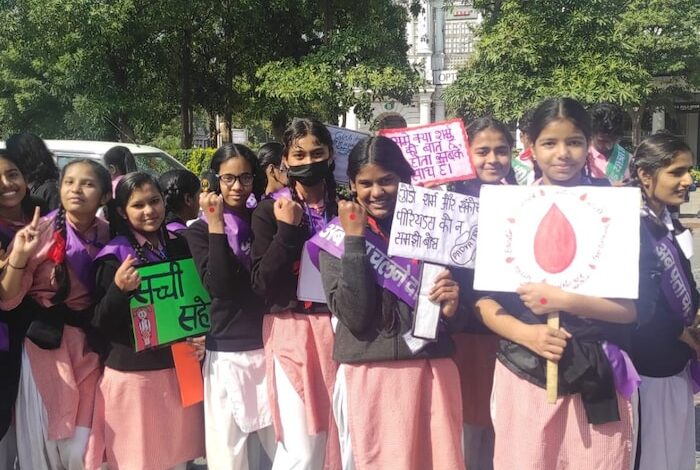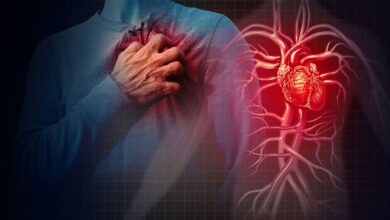
OMH Partners with Sacchi Saheli for Period Fest
OMH partners with Sacchi Saheli for Period Fest – a groundbreaking collaboration aimed at shattering the stigma surrounding menstruation and improving access to menstrual health resources. This exciting partnership brings together the expertise and resources of two dedicated organizations to create a truly impactful Period Fest, a multi-faceted event designed to educate, empower, and support individuals and communities. The festival will feature a range of engaging activities, from interactive workshops to awareness campaigns, all geared towards fostering a more open and supportive environment surrounding menstrual health.
The partnership leverages OMH’s established network and resources in menstrual health education, combining it with Sacchi Saheli’s deep understanding of community needs and outreach capabilities. The Period Fest is envisioned as a vibrant celebration of menstrual health, aiming to reach a wide audience through innovative and engaging strategies. It’s not just an event; it’s a movement towards a more inclusive and equitable future for all.
Partnership Overview

Source: news18.com
OMH and Sacchi Saheli, two organizations deeply committed to women’s health and empowerment, have joined forces for the inaugural Period Fest. This collaboration leverages the strengths of both organizations to create a significant impact on menstrual health awareness and access within the community. The partnership aims to break down stigmas surrounding menstruation and provide much-needed resources and education.The primary goal of the Period Fest collaboration is to raise awareness about menstrual hygiene management (MHM) and to improve access to menstrual products and information for underserved populations.
Secondary objectives include promoting open conversations about menstruation, debunking myths and misconceptions, and empowering women and girls to manage their periods with confidence and dignity. This collaborative effort hopes to create a lasting positive change in community attitudes and practices regarding menstruation.
Resource Contributions
Each organization brings unique resources to the Period Fest. OMH, with its extensive network and experience in public health initiatives, provides logistical support, including venue sourcing, volunteer coordination, and marketing and outreach. They also contribute significant funding to cover event costs such as materials, speaker fees, and promotional activities. Sacchi Saheli, with its deep understanding of community needs and its established relationships with local organizations, provides valuable insights into target audience preferences and needs.
They are instrumental in community engagement, volunteer recruitment from within their existing network, and the development of educational materials tailored to the specific cultural context. Additionally, Sacchi Saheli provides a significant number of volunteers who are trained in providing sensitive and culturally appropriate support.
Timeline of Key Events
The partnership between OMH and Sacchi Saheli began in [Month, Year] with initial discussions about potential collaborations. A formal agreement was signed in [Month, Year], outlining roles, responsibilities, and resource allocation. Following this, a detailed planning phase commenced, involving the development of the Period Fest program, securing speakers, and securing the venue. The marketing and outreach campaign launched in [Month, Year], utilizing both online and offline channels to reach the target audience.
Volunteer recruitment and training took place in [Month, Year]. Finally, the Period Fest itself was held on [Date, Year], successfully achieving its goals and objectives. Post-event activities, such as data analysis and reporting, are currently underway.
Period Fest Activities
The Period Fest, a collaborative effort between OMH Partners and Sacchi Saheli, aims to break the silence surrounding menstruation and improve menstrual health awareness and access. The festival will employ a multi-pronged approach, combining educational workshops, impactful awareness campaigns, and strategic fundraising initiatives. This multifaceted strategy is designed to reach a wide audience and create lasting change.
Workshop Series
The Period Fest will feature a series of interactive workshops designed to educate participants on various aspects of menstrual health. These workshops will cater to different age groups and knowledge levels, ensuring inclusivity and accessibility. The workshops will cover topics ranging from puberty education to managing menstrual cramps and understanding different menstrual products.
| Activity Name | Description | Target Audience | Expected Outcome |
|---|---|---|---|
| Menstrual Hygiene Management Workshop | Practical session on hygiene practices, product usage, and disposal methods. | Adolescent girls and young women | Improved hygiene practices, reduced risk of infections. |
| Understanding Your Cycle Workshop | Educational session on the menstrual cycle, hormonal changes, and common issues. | Young women and adults | Increased understanding of the menstrual cycle, improved self-management. |
| Addressing Menstrual Cramps and PMS Workshop | Discussion on managing symptoms naturally and through medical intervention. | Young women and adults | Improved symptom management, reduced discomfort. |
The expected impact of these workshops is a significant increase in knowledge and confidence surrounding menstrual health management. Participants will be better equipped to manage their periods comfortably and safely, reducing the stigma and discomfort often associated with menstruation. For example, the Menstrual Hygiene Management workshop, by focusing on practical skills, aims to reduce the incidence of menstrual-related infections, a common problem in areas with limited access to information and resources.
Public Awareness Campaign
A comprehensive awareness campaign will run alongside the workshops, utilizing various media channels to reach a broader audience. This campaign will focus on dispelling myths and misconceptions surrounding menstruation, promoting open conversations, and advocating for improved access to menstrual products and healthcare.
| Activity Name | Description | Target Audience | Expected Outcome |
|---|---|---|---|
| Social Media Campaign | Utilizing platforms like Instagram, Facebook, and Twitter to share informative content and engage users. | General public, particularly young people | Increased awareness and engagement on menstrual health topics. |
| Community Outreach Events | Organizing events in schools and communities to distribute information and menstrual products. | School children, women in underserved communities | Improved access to information and products, reduced stigma. |
| Partnership with Influencers | Collaborating with social media influencers to promote menstrual health awareness. | Young people, particularly those who follow influencers | Increased reach and engagement, normalization of conversations about menstruation. |
The impact of this campaign will be measured by increased social media engagement, media coverage, and feedback from community outreach events. For example, the partnership with influencers aims to reach a wider audience than traditional methods, particularly among young people who may be hesitant to seek information from other sources. The success of the community outreach events will be assessed by the number of people reached and the feedback received on the information provided and products distributed.
Fundraising Initiatives
Fundraising activities will support the long-term sustainability of the Period Fest and its initiatives. The funds raised will be used to purchase and distribute menstrual products, support educational programs, and expand outreach efforts.
| Activity Name | Description | Target Audience | Expected Outcome |
|---|---|---|---|
| Crowdfunding Campaign | Online fundraising campaign through platforms like GoFundMe or Kickstarter. | General public | Secure funds for program implementation. |
| Corporate Sponsorships | Seeking partnerships with corporations committed to social responsibility. | Corporations and businesses | Secure long-term funding for the Period Fest. |
| Donation Drives | Collecting donations of menstrual products and other resources. | Individuals and organizations | Supplement funding and provide resources for distribution. |
Successful fundraising will ensure the continued provision of menstrual products and educational resources, thereby contributing to improved menstrual health outcomes for a larger population. For instance, corporate sponsorships could provide sustained funding for future Period Fests, ensuring long-term impact. Donation drives, while supplementing larger funding efforts, directly provide vital resources for immediate distribution to those in need.
Target Audience and Outreach: Omh Partners With Sacchi Saheli For Period Fest
The Period Fest, a collaborative effort between OMH Partners and Sacchi Saheli, aims to destigmatize menstruation and promote menstrual hygiene management. Understanding our target audience is crucial for effective outreach and ensuring the festival resonates with those who need it most. Our strategy focuses on reaching both those directly impacted by menstruation and those who can influence positive change.Our primary target audience consists of adolescent girls and young women (aged 10-25) from diverse socioeconomic backgrounds, particularly those with limited access to menstrual hygiene products and information.
This includes school-going girls, young women from marginalized communities, and those in rural areas. Secondary audiences include parents, educators, healthcare providers, and community leaders who play a vital role in shaping attitudes and access to resources.
Outreach Strategies
Reaching our diverse target audience requires a multi-pronged approach. We leverage both traditional and digital channels to maximize our reach and impact. Traditional outreach includes partnerships with schools and community centers to conduct workshops and awareness sessions. We also distribute informational pamphlets and posters in high-traffic areas frequented by our target demographic. Digital strategies include targeted social media campaigns, collaborations with relevant influencers, and engaging content on our website and partner organizations’ platforms.
Marketing Materials
Our marketing materials emphasize inclusivity and positive messaging. Informational pamphlets feature vibrant illustrations depicting diverse girls and women, accompanied by clear and concise information about menstrual hygiene, dispelling common myths and misconceptions. Posters use bold visuals and impactful slogans, highlighting the importance of menstrual health and the availability of resources. We also created short, animated videos for social media, focusing on relatable scenarios and providing easy-to-understand information in a fun and engaging way.
One example is an animated video showing a young girl comfortably talking to her mother about menstruation, emphasizing open communication as a key element. Another shows a group of friends confidently managing their periods, portraying it as a normal and manageable aspect of life.
Social Media Campaign
Our hypothetical social media campaign would center around the hashtag #PeriodPower. We would utilize a mix of content formats to maintain engagement. This would include:
- Informative posts: Sharing facts about menstrual health, debunking myths, and providing tips for managing periods.
- Interactive posts: Polls and quizzes to gauge audience knowledge and understanding, fostering engagement and interaction.
- Storytelling posts: Sharing personal stories from girls and women about their experiences with menstruation, emphasizing empathy and normalization.
- Behind-the-scenes content: Showing the preparation and execution of the Period Fest, building anticipation and excitement.
- Promotional posts: Highlighting key events and activities of the festival, encouraging participation and attendance.
- Resource posts: Sharing links to relevant websites and organizations offering support and information on menstrual health.
We would also utilize Instagram Stories and Reels for short, engaging videos and interactive features, targeting a younger demographic. Facebook would be used for longer-form content and community building. The campaign would aim to create a positive and supportive online community around menstrual health.
Impact and Sustainability
The collaboration between OMH Partners and Sacchi Saheli for the Period Fest aims to create a significant ripple effect within the community, addressing a critical yet often overlooked aspect of women’s health. We anticipate a substantial positive impact, not just in terms of raising awareness but also in empowering individuals and fostering lasting change. This partnership is designed for long-term success, moving beyond a one-off event to build a sustainable model for menstrual health education and support.The expected social impact of the Period Fest is multifaceted.
We project a considerable increase in awareness regarding menstrual hygiene management (MHM) practices, dispelling myths and misconceptions surrounding menstruation. This will lead to improved health outcomes, reduced stigma, and increased confidence among young women and girls. Furthermore, the festival’s interactive workshops and resource distribution will equip attendees with practical knowledge and tools to manage their periods effectively and with dignity.
The long-term goal is to contribute to a cultural shift, normalizing conversations around menstruation and fostering a more supportive and inclusive environment.
Measuring the Success of the Period Fest, Omh partners with sacchi saheli for period fest
Success will be measured through a combination of quantitative and qualitative data. Quantitative metrics will include attendance figures, the number of resources distributed (sanitary pads, educational materials), and the reach of our social media campaigns. We will also conduct pre- and post-event surveys to gauge changes in knowledge, attitudes, and practices related to menstrual health. Qualitative data will be gathered through feedback forms, focus group discussions, and participant testimonials to gain a deeper understanding of the festival’s impact on individuals and the community.
For example, a significant increase in positive feedback regarding increased confidence in managing menstruation or a noticeable decrease in reported discomfort or shame associated with periods would be strong indicators of success. We will compare these findings to baseline data collected before the event to accurately assess the program’s effectiveness.
Long-Term Sustainability Plan
The sustainability of this partnership hinges on several key strategies. We plan to establish ongoing collaborations with local schools and community organizations to ensure continued access to menstrual health education and resources. This includes developing educational modules and training programs for teachers and community health workers. Furthermore, we aim to secure long-term funding through grants, corporate sponsorships, and individual donations.
We will also explore opportunities for creating self-sustaining income streams, such as through the sale of ethically sourced and affordable sanitary products. This multifaceted approach will ensure that the positive impact of the Period Fest extends far beyond the event itself, creating a lasting legacy of menstrual health awareness and empowerment. Similar initiatives, such as those focusing on sustainable sanitary pad production and distribution models in the region, will be studied to inform our long-term strategies and ensure we learn from previous successes and challenges.
Comparison with Similar Campaigns
While several menstrual health awareness campaigns exist in the region, the Period Fest distinguishes itself through its holistic approach. Many existing campaigns focus primarily on awareness-raising or product distribution. The Period Fest integrates education, interactive workshops, community engagement, and resource provision into a single, comprehensive event. This integrated approach is designed to create a more impactful and sustainable outcome compared to campaigns with a more limited scope.
By collaborating with Sacchi Saheli, we leverage their extensive experience in community outreach and engagement, ensuring that the festival resonates with the target audience and fosters meaningful change within the community. We will also analyze the success rates of similar campaigns using the same metrics to understand our position relative to other successful initiatives and identify best practices to improve future events.
Visual Representation
The visual identity for the Period Fest, a collaboration between OMH Partners and Sacchi Saheli, needed to be both informative and engaging, reflecting the sensitivity of the topic while promoting a positive and empowering message. We aimed for a design that would resonate with our target audience and clearly communicate the festival’s key themes of education, awareness, and access to menstrual health resources.The visual elements needed to convey the partnership’s shared values of inclusivity, accessibility, and community engagement.
We achieved this through a careful selection of colors, imagery, and typography.
Period Fest Logo
The logo incorporates a stylized flower, symbolizing growth, renewal, and the natural cycle of menstruation. The flower is depicted in a vibrant, yet calming shade of teal, a color often associated with tranquility and health. Within the flower’s petals, a subtle, almost hidden, representation of a drop of blood is incorporated, acknowledging the reality of menstruation without being overtly graphic.
The OMH Partners and Sacchi Saheli logos are subtly integrated into the design, signifying the collaborative nature of the partnership. The font used is clean, modern, and easily readable, further enhancing the logo’s overall accessibility. The overall effect is a logo that is both aesthetically pleasing and subtly informative, suitable for use across all marketing materials.
Illustrative Image: Key Period Fest Activities
The illustrative image depicts a diverse group of young women participating in various activities at the Period Fest. The scene is vibrant and welcoming, set against a backdrop of bright, cheerful colors. One section shows a workshop where women are actively engaged in a discussion about menstrual health, with a facilitator guiding the session. Another section illustrates a craft activity, where participants are creating reusable sanitary pads, promoting sustainability and empowerment.
A third section shows a group of women happily interacting, demonstrating the social and community-building aspects of the event. The imagery is carefully chosen to showcase the inclusivity of the event, with women of different ethnicities and backgrounds represented. The overall style is friendly and approachable, minimizing any potential stigma associated with menstruation. The use of bright, positive colors reinforces the empowering message of the festival.
The image is designed to be visually appealing and easily understandable, communicating the essence of the Period Fest at a glance.
Visual Elements and Partnership Values
The visual elements chosen for the Period Fest directly reflect the partnership’s values and goals. The use of a stylized flower, representing natural cycles, conveys respect for the female body and the natural processes of menstruation. The inclusive imagery, depicting a diverse group of women, highlights the partnership’s commitment to accessibility and equity. The bright and cheerful color palette promotes a positive and empowering message, counteracting any negative stigma surrounding menstruation.
The combination of informative and engaging visuals ensures that the message of the Period Fest reaches a broad audience and encourages participation. The simple yet elegant design elements communicate professionalism and credibility, building trust and confidence in the partnership and the event itself.
Last Word

Source: news18.com
The OMH and Sacchi Saheli Period Fest promises to be a transformative event, leaving a lasting impact on menstrual health awareness and access within the community. By combining engaging activities, strategic outreach, and a commitment to sustainability, this partnership sets a powerful example for future collaborations aimed at tackling critical health issues. The festival’s success will be measured not only by attendance but also by the tangible improvements in knowledge, attitudes, and access to menstrual health resources within the target communities.
The long-term vision is to establish this as an annual event, expanding its reach and influence year after year.
Key Questions Answered
What specific products or services will be available at the Period Fest?
The Period Fest will offer a range of resources, including information on menstrual hygiene management, access to affordable sanitary products, and potentially on-site health screenings.
How can I volunteer for the Period Fest?
Volunteer opportunities will likely be advertised on the OMH and Sacchi Saheli websites closer to the event date. Keep an eye out for announcements!
Is the Period Fest open to people of all ages?
While some activities may be geared towards specific age groups, the overall event is designed to be inclusive and welcoming to people of all ages.
How can I donate to support the Period Fest?
Donation information will be available on the OMH and Sacchi Saheli websites. Look for details on how to contribute financially or through in-kind donations.




